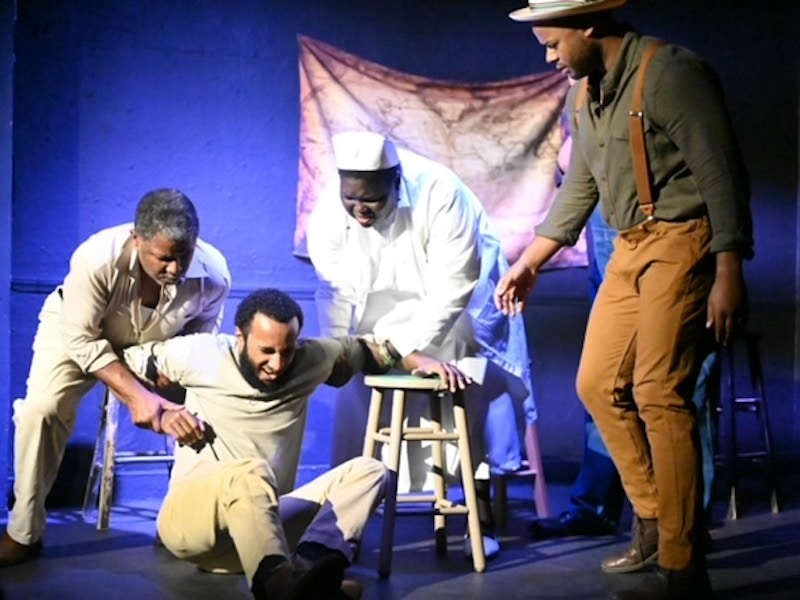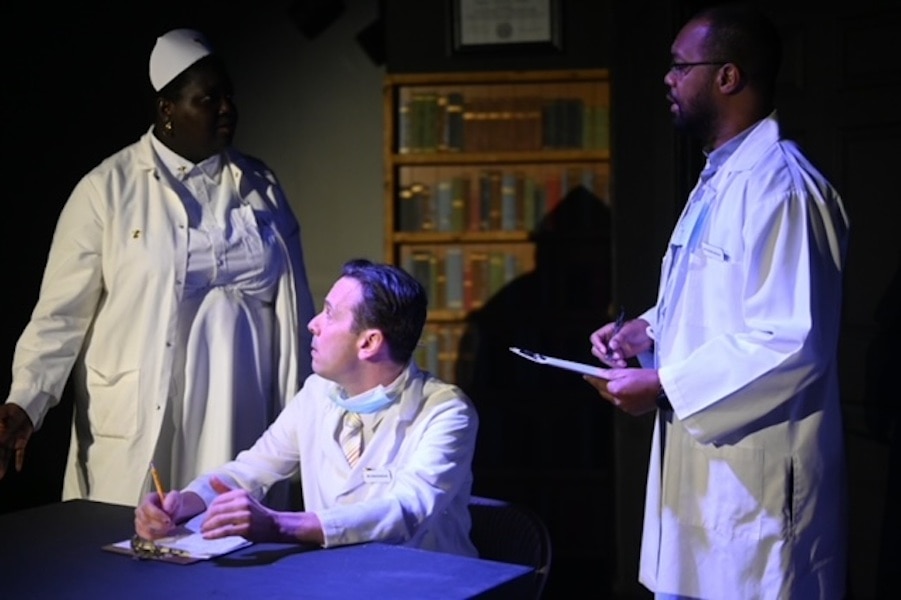Once upon a time, government oversight was a vague concept. Once upon a time, informed consent applied mainly to surgical procedures. In 2024, we like to think of ourselves as medically and ethically responsible when it comes to medical studies, drug trials, and research undertakings. The fact that we now have oversight, informed consent requirements, and voluntary withdrawal by the subject at any point in any study is partially due to a July 1972 New York Times exposé written by journalist Jean Heller about the Tuskegee Study, now commonly known as “the infamous Tuskegee Study” but originally titled The Tuskeegee Study of Untreated Syphilis in the Negro Male.
Miss Evers’ Boys is a fictional drama, with fictionalized characters based on this study and the real people in it. As American history, even fictionalized, it is a strong story that needs telling and retelling, as often as needed. In 1932, there were few protections for any poor workers, and even fewer for the Black poor. This is the story that Producer Maureen Rogers and Director Lorraine Brooks bring to Laurel Mill Playhouse. Their production of Miss Evers’ Boys, despite telling a story that began nearly 100 years ago, has both controversy and complexity that still have sad relevance to contemporary life.

The cast is terrific. Playing Miss Evers, Jackie Youm gives the character quiet dignity, devotion, and a moral conscience, as well as observable but understated emotion. Her transition from her older self to her younger, memory self is remarkable. She and Tim Godbee, who plays Caleb, have tender, charming chemistry, which transitions to something much more complicated as the play progresses. As Caleb, Godbee is the most complex of the “boys” and with nuance enacts a character who rejects the “common good” argument. Martin Young as Ben is sturdy and affable, while Evan Simon’s Willie is fiery and demonstrative.
You’d be forgiven for believing that the study physicians would be the antagonists of the piece, but they are not. In this show, the “antagonist” is an abstract, rather than an individual. Pierre Walters plays Dr. Eugene Brodus as inscrutable and stubbornly devoted to research, delivering a restrained but nuanced performance. Derek Sollosi, who plays Dr. John Douglas, clearly outlines his reasoning for his devotion to “a pure study” and in many ways is a likable, identifiable person.
Director Brooks, faced with the pocket-sized stage at Laurel Mill, rises to the occasion. Rather than attempting to realistically portray the different settings required by the script, she anchors a few set pieces in different areas, to which the players gravitate to suggest different locations. Her characters interact believably and her blocking is organic.
Projections that act as bookends to the show are effective, and I like the music during them and the transitions. I do wish the pace of the show better reflected the urgency of the topic — every sequence seemed long, creating a three-hour run time, a tall ask of an audience. Author David Fedshuh, originally writing the piece for a dramatic reading, creates a script that makes and repeats points and dialogue more times than necessary.

That the U.S. government continued this study, despite the Nuremberg Code of 1947 (ten points that restrict researchers from abusing human subjects), despite the 1964 Helsinki Declaration (which outlines in detail the ethical treatment of human research subjects), and despite there being a clear cure for syphilis as early as 1943, is inarguably horrifying. The human beings close to the issue, however, each have their own answer to the question “How did this happen?” Understanding just how close we are to dehumanizing one another is important, lest we stand by and observe as history repeats itself. Seeing Miss Evers’ Boys at Laurel Mill is a significant step toward that understanding.
Running Time: Three hours and 12 minutes, including one 15-minute intermission.
Miss Evers’ Boys plays through February 25, 2024 (Friday and Saturday at 8 PM, Sunday at 2 PM), at Laurel Mill Playhouse, 508 Main Street, Laurel, MD. Tickets ($20, adults; $15, children 18 and under, seniors 65 and over, and active duty military) can be purchased online. Some street parking is available, and a small lot at the end of the block, despite the Pay To Park signage, is free for theatergoers.
The program for Miss Evers’ Boys is online here.
COVID Safety: Laurel Mill Playhouse strongly urges that all patrons who come to LMP be vaccinated and wear masks. At this time, LMP will not require vaccination cards and masks but reserves the right to change this policy.
Historical Factoid: Sometimes people misunderstand the 1932 Tuskegee Study to have been a willful infection with syphilis of the men involved, like smallpox blankets, but this was not the case. Previously infected and uninfected volunteers, 600 of them, participated in this research, and continued to do so, even decades after penicillin was discovered to treat and cure syphilis. In Guatemala, however, from 1946 to 1948, soldiers, prisoners, and mentally ill people, both men and women, were deliberately infected with syphilis, without their knowledge, in an attempt to discover if penicillin would prevent subjects from acquiring the disease rather than just curing it once they had it. Understandably, contemporary people combine these atrocities into a single story. —C.P.





There’s more run on sentences in this review than a toddler telling you about their day. Clearly the author’s still writing with a crayon. The first two paragraphs were a FIGHT to get through. Honestly would’ve walked away if I weren’t genuinely curious to see how bad Baltimore prose played out in this “journalism”.
All in all though, might still see the play.
We’re sorry the first two paragraphs of this review were not readily readable for you. (For the record it contained no run-on sentences, as that term is ordinarily defined.) Nevertheless we hope this review encouraged you to see this worthy play, and we greatly appreciate your feedback.